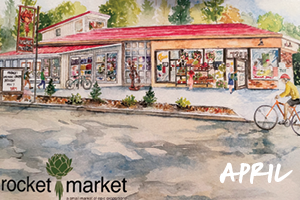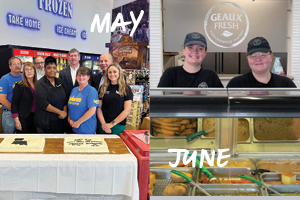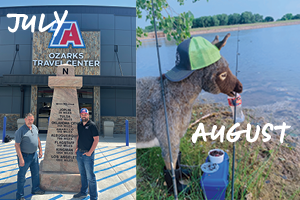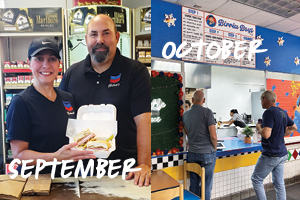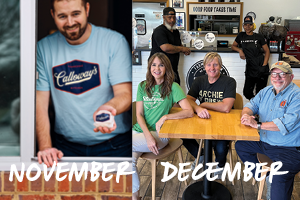I thought this was the perfect time to look back at 2023. Were there ideas in last year’s Gas Station Gourmet that you could implement in your store in 2024? Let’s look back.
Building a Great Team
In February, this column profiled The Old Koke Plant in Brookhaven, Mississippi. It’s no surprise that hiring the right cooks is key to great food. Passion is crucial.
Cathy Pigott, retail operations manager, has a simple strategy.
“I had them tell me about cooking,” she said. “Do you like to cook? We hired no one who liked to cook—we hired the ones who loved to cook. The interviews were personal. We wanted to know where they learned to cook. How did they learn to cook? What made them love to cook? The ones who love it have a history.”
Cooks are creative, and they all have different styles. Pigott gives them the freedom to do what they love.
“This is a challenging environment to retain workers, especially cooks,” Pigott said. “The Old Koke Plant has experienced almost no turnover.”
Once you hire staff, how do you keep them? Pigott said, “It’s a lot about hugs.”
For the July issue, I talked with Chase Wilmoth of Ozarks Travel Center in Mount Vernon, Missouri, and learned he focuses on the person and not the job history.
“In my mind, it’s people skills, not past experience. If you can talk to people, be friendly and carry on a conversation, it’s better than experience. We can train people to be good employees,” he said.
“We don’t want to be the place where people are working and they’re looking for a job that pays better, we want to be the place that pays better,” he added.
Creating Signature Food
A customer’s passion for your menu items often comes from painstaking attention to detail. For the March issue, I had a chance to talk to Chef Robert Scott at America’s Street Food in Little Rock, Arkansas. His thoroughness is key to bringing customers back again and again.
“Customer like our sandwiches,” Scott said. “The burger we use is fresh-ground rib-eye. We make our own corned beef and Thousand Island dressing for the Reuben. We smoke our pulled pork for 14 hours.”
He added, “I had a guy come in from North Carolina. He was a doctor, and someone told him to come check us out. He said it was the best Reuben he’s ever had.”
Customers can tell the difference.
In the April issue, Alan Shepherd at the Rocket Market in Spokane, Washington, shared a few things that set his store apart. He said his foodservice is all about “cool or interesting food.” Again, this is about taking those extra steps that will take your menu items to the next level.
To many, bread seems simple. Not here. Shepherd has a friend who makes the bread for the store.
Shepherd said, “He uses the sourdough method. He only uses heirloom grain from within a 100-mile radius. They’re old native varieties that might have gone away. They’re super interesting. We sell his bread—it’s $10 a loaf.
“This is the best bread I’ve had. It’s all made by hand. He knows his grains. No one scoffs about the price. It’s incredible bread. These are highly unusual ancient grains.”
He added, “It’s all sourdough. People who are gluten-sensitive can eat his bread. His whole bakery is wood-fired. It’s super unique. We are wildly fortunate to have this guy. It’s a true art form to use this oven.”
Deep in the heart of Cajun Country, Hebert’s Mini Mart created a buzz with chicken salad. In September, owner L’ree Gates Hebert told us how something as simple as chicken salad can make a store a destination.
Simple? Maybe it’s not so simple. What sets this chicken salad apart?
“I really think it’s the chicken we use,” Hebert said. “We’re a Krispy Krunchy store. We’ve been Krispy Krunchy almost since the beginning. The tenders are marinated with their (Krispy Krunchy) seasoning. It’s what makes the chicken tenders so good. Because they’re marinated, that flavor profile shows up in our chicken salad.”
Customers can buy a chicken salad sandwich, but here, the chicken salad is sold by the pound.
“When customers go on road trips, they bring this along,” Hebert said. “We just had a group of people going to the beach stop in and buy it so they can make sandwiches. Every time we’re invited to a party, we’re asked if we’re bringing chicken salad.”
She added, “Consistency and simplicity make our food what it is. We don’t try to overdo things. If you eat chicken salad from us today and you eat it a year from now, it’s going to be the same.”
Chris Cornelis had a successful food truck called Birria Boys. He was looking around Elk Grove, California, for a brick-and-mortar location and ran across a deserted Blimpie in a Shell station and saw the potential. Gas station food in this part of California is uncommon.
“We brought life to it,” he said.
In the October issue, Cornelis explained that the star of this food show is birria, a traditional Mexican soup or stew made with beef short rib. Preparing this popular birria is a process. First, it is seasoned with 20 spices. “It takes about an hour and a half of prep prior to cooking,” he said. “We cook it for nine hours. By the time it’s done, there is no bone, no cartilage, and it is shredded on a taco.”
A common theme is a relationship to the community. Cornelis feels strongly about giving back to the people who have helped him become a success.
“A big thing for us is community service,” he said. “Our first year in the food truck, I teamed up with my friend who had a car shop. We collected toys for Christmas and got about 1,000 toys. This year at the store, we teamed up with our local fire department and helped raise money for the local burn unit.”
Maximizing Social Media
Store operators wear a lot of hats. Social media may be low on their list of priorities, but a little time goes a long way.
In the January issue, this column introduced you to The Corner Grocery in Loreauville, Louisiana. During the pandemic, social media was a lifeline to its customers.
Co-owner Mandi Pooler said, “During Covid, I came in and started working the page. I said, ‘Let’s post a picture of the plate lunch every day at 10:30 a.m. We noticed if we didn’t post a picture, sales might not be as good. During the pandemic, we’d post pictures of hard-to-get items, and immediately you’d see people walking in the doors.”
She added, “In this rural town, people follow social media. Word travels fast. People call each other to let them know the items are available. We’ve also done some employee spotlights. We post more during the holidays—things that are relevant to the season.”
Building Community Connection
If you want to know how important your store is to your community, just wait until a natural disaster. On August 27, 2020, Hurricane Laura made landfall in Lake Charles, Louisiana. It packed 150-mile-per-hour winds and came with an 18-foot storm surge. The community was devastated.
ShopRite/Tobacco Plus No. 20 was destroyed. Two days later, a small group from the management team was implementing a plan to help the community get back on its feet. Director of Food Services Angelle Cloud talked about that in May.
“Everything was out,” Cloud said. “I didn’t see any power coming or going. There was a lot of debris in the road. You were trying to drive around phone poles and roofs. We were down here before the road crews.
“The community was in shock, but so were the employees. Taking care of the staff members directly impacted was a priority. The company tried to find places for employees to stay or get generators to power their homes if they could stay in them.”
If you’ve never seen a community after a hurricane, it looks post-apocalyptic.
The ShopRite/Tobacco Plus team brought in a food truck and started cooking hamburgers. Residents came in droves.
“It felt like we were the only people selling food,” Cloud said. “We could hardly walk out of the truck because so many people were there for food. For us to offer a hot meal was huge. They would say, ‘My kids just want a hamburger.’ People were so kind even though things were so broken. They would pull up and ask us if we needed anything.”
The hard work paid off in goodwill. People knew ShopRite/Tobacco Plus cared.
Cloud recalled the day cheese slices arrived: “When I told a lady she could have a cheeseburger, she almost cried. It was so simple, but it meant everything. We offered everything we could. We wanted to live up to the love we built with them in the food truck.”
If you’re a regular reader, you’ll find that so many successful c-store food programs don’t just include food but also a genuine, meaningful experience for the customer.
At Geaux Fresh in Broussard, Louisiana, it starts the moment a customer opens the door. When I walked through the door, the employee behind the counter, Kim, made eye contact and offered a warm greeting: “Welcome, can I help you?”
I was so happy to be there, and it only took five words.
Those words are no doubt heard thousands of times each day in gas stations across the country. But it was not just the words but the way Kim said them. She made me feel welcomed. It felt sincere. Working with employees to accomplish this might be worth the effort.
In June, owner Marlo Faucheaux gave me a little insight into how her team creates that special relationship with customers. Before she began explaining, I saw it firsthand when a man walked up to the counter.
“That’s Dwayne,” Faucheaux said, pointing to the deli counter, “Every day, he orders red beans and rice with an extra piece of sausage. He knows all of the girls, and they know him. … We know about 75% of our customers.”
The staff was talking to Dwayne as they fixed his plate. Does he feel valued? Yes. Does he feel like this is his place? Indeed he does.
I saw this happen again and again.
Keep in mind that this doesn’t just happen. You have to create and foster this environment in your store.
Faucheaux said, “We are extremely blessed with the team we have. They are the faces of Geaux Fresh and one of the most important reasons our customers love our store.”
Preserving a Sense of Fun
You want to serve great food in your store. You want to offer a good value. You want customers to feel good about your staff. What if you have a fun place and customers just like being there?
The Hoagland sisters own Red Dirt Jack’s in Medicine Lodge, Kansas. The food is very popular with customers. They’re serving Grandma Eva’s recipes—who wouldn’t love grandma’s meatloaf?
There is one question, though: Who is Jack?
He is a life-size, stuffed miniature donkey that’s brought that sense of fun to the store, and customers love him. The sisters brought him on trips, and he became well-known through blog posts and social media. He’s on t-shirts sold at the store. When customers go on vacation, they take photos wearing Red Dirt Jack t-shirts.
This is no ordinary stuffed animal. He has a steel skeleton, so kids come into the store and jump on his back. If you talk to the Hoagland sisters—Marsha, Rhonda and Diane—it doesn’t take long for their fun spirit and zest for life to come over you like a wave of marshmallows and sprinkles. Customers of all ages pick up on this.
Diane said a customer told her that her 12-year-old son said he wanted to go to the store. He told his mother, “I feel good when I go in. I don’t know what it is, but I like it.”
Creating Food That’s Affordable and Local
Keeping your ingredients local can go a long way when it comes to flavor and freshness, as Calloway’s Tennessee Kitchen in Maryville, Tennessee, knows.
In the November issue, Calloway Oil Company Vice President Trenton Langston put it simply: “We’re a family business. We want to have the best ingredients and feed other families as we would feed our own. We try to stick to a simple pantry of ingredients that you might have in your own home but use them in a way that celebrates the quality of the food and creates fun experiences right in our gas stations.”
Calloway’s Tennessee Kitchen had a great idea. The team spent a couple of months working with the Tennessee Department of Agriculture, the Nourish Knoxville Farmers Market and the University of Tennessee Culinary Institute.
“We met with the local agriculture extension agent to see how we could go 100% local but then realized we would need to start with a few key items and work on expansion,” Langston said. “We don’t claim to be local all the time, but we are continuing to try.”
Simple food always seems to work.
One of my favorite quotes of the year came from this story. Langston said, “A good burger doesn’t have to be outlandish. Our goal is to present you with a great all-American cheeseburger with fresh ingredients and local produce whenever available.”
Honoring the Road Trip
I took a little drive with two great American road trippers, Stephanie Stuckey (chair, Stuckey’s Corp) and Stafford Shurden (creator of Gas Station Tailgate Review), and Stuckey suggested visiting Che Butter Jonez in Atlanta.
You will feel the vibe in this unique eatery. Husband-and-wife team Malik Rhasaan and Detric Fox-Quinlan own this unique eatery located next to a Chevron station.
Rhasaan knows people are deeply connected to food. Successful chefs often tell me their secret ingredient is love. There is something to this.
“I’m sharing a piece of me in every entree I create,” Rahsaan said. “It’s been great introducing people to flavor profiles they never knew they needed.”
He added, “Food should be comforting and have nostalgia attached. Food is connected to people’s emotions, and luckily for me, our customers find comfort in my food. Many come to decompress, and I watch them let all of the pains of the day disappear through a great meal. It’s satisfying for them and for me. We’re providing a service that taps into a need of our customers.”